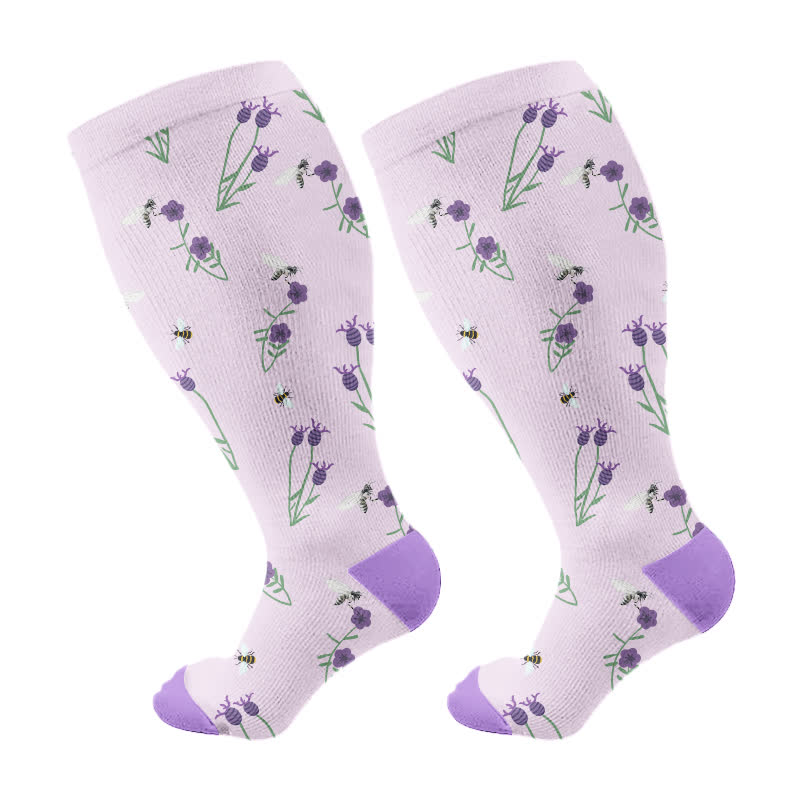Compression socks are not just a medical trend. They’ve become an effective solution for anyone dealing with poor circulation, swelling, or itching legs. People wear these socks for many reasons, like chronic conditions, post-surgery recovery, long flights, workouts, or standing and sitting on their feet for a longer time.
As it has a lot of benefits, it’s natural to think: Can you sleep in compression socks? The answer is yes—you can. But whether it’s helpful depends on your situation and needs. When you're lying down, your legs are free from the gravitational effect, so the added compression might not always be necessary.
In this article, we’ll learn how compression socks work, why to wear them, and what to consider for overnight use.
How Do Compression Socks Work?
Compression socks improve the flow of blood from the legs back to the heart by providing compression. When the veins in the legs don’t function properly, blood can start to pool in the lower limbs, making it harder for the body to circulate waste-filled blood.
Compression socks gently squeeze legs with graduated pressure, tighter around the ankles and gradually looser toward the top. It improves blood circulation, reduces swelling, and can relieve pain, fatigue, discomfort, and itching. It also lowers the risk of blood clots, especially during long periods of sitting or standing.
Why Wear Compression Socks While Sleeping?
Wearing compression socks overnight can be helpful for people who experience excessive swelling, bruising, numbness, tingling, and poor circulation. Doctors also recommend wearing them for a few hours or overnight for post-op surgical recovery to improve blood circulation.
However, wearing compression socks all night is not suggested for a healthy person, as it can cause skin irritation, itching, redness, and also reduce the skin’s ability to breathe. Therefore, before incorporating nighttime use into your routine, it's important to consult with a healthcare provider for personalized guidance.

Who Might Benefit Most From Nighttime Use
Most doctors do not recommend wearing compression socks at night, as they are generally less effective when you’re lying down compared to daytime use, when your legs are affected by gravity. However, there are certain conditions where a doctor may suggest wearing compression socks while sleeping:
- If you are suffering from excessive swelling and soreness
- If you are recovering from invasive surgeries like phlebotomy
- If you want relief from restless leg syndrome
- If you are dealing with deep vein thrombosis
- If you have a venous ulcer or are recovering from venous ulcer surgery
What to Look for in Compression Socks for Overnight Comfort
Here is a short guide to choosing the right compression socks for overnight comfort.
Compression Level
Look for compression socks with the right level of compression—not too tight to restrict blood flow and not too loose to be ineffective. Compression socks for daytime use usually have a higher compression level than those for nighttime use. For night wear, you can choose lighter compression socks (8–15 mmHg). If you have a certain medical condition, be sure to consult your surgeon for the correct pressure level.
Finding the Right Fit
Compression socks come in various sizes and shapes. Before buying, measure your ankle circumference, calf width, and leg length. If you're buying online, there will usually be a size chart available on the website. Compare your measurements to choose a size that fits snugly, not so tight to restrict blood flow or cause pressure marks.
No Bunching or Rolling
Look for socks with wide cuffs or silicone grips to help prevent bunching or rolling while you sleep.
Breathable, Skin-Friendly Fabric
Make sure the socks are made of breathable materials like cotton, bamboo, or medical-grade nylon that wick moisture away from your skin.
Hot Products:
2XL-7XL Colorful Cool Lines Plus Size Compression Socks(3 Pairs)
2XL-7XL Plus Size Bright Stripe Compression Socks(3 Pairs)
FAQs
When not to wear compression socks?
People with peripheral artery disease (PAD), diabetic neuropathy, or severe heart failure should avoid wearing compression socks. You should also avoid them if you have an open wound, an infection, sensitive skin, or a fabric allergy.
Does wearing compression socks at night help with circulation?
Yes, wearing compression socks at night can help with circulation in certain conditions. It may be beneficial for people who experience numbness or tingling, severe nerve inefficiency, chronic swelling, restless leg syndrome, or are recovering from surgery. However, for a healthy person, wearing compression socks at night might not be very beneficial.
Should diabetics wear compression socks to bed?
Yes, diabetics can wear compression socks at night if their doctor prescribes them. Whether or not they are helpful depends on the individual's specific condition, so it’s best to follow your doctor’s guidance.
Also, check our latest collection of plus size compression socks, specially designed for comfort and support.
Is it safe to sleep in compression socks while pregnant?
Wearing compression socks stimulates blood flow, squeezes the legs, and supports muscles and joints. Most pregnant women feel relaxed wearing these socks during the day, and they also help reduce the risk of varicose veins and blood clots. However, wearing socks at night depends on personal preference and the surgeon's recommendation.

Conclusion
Wearing compression socks helps relieve pressure from your ankles and lower legs, reduces swelling, and provides comfort. Most people benefit from wearing compression socks during the day, but you can sleep in compression socks. However, consider all the above discussion and your doctor’s guidance for the best outcomes. Also, consider the fabric, size, and material before buying.
Our compression socks come in different sizes, shapes, and are made for various purposes. Visit plusock.com to find the best pair that suits your needs.
Read more:

